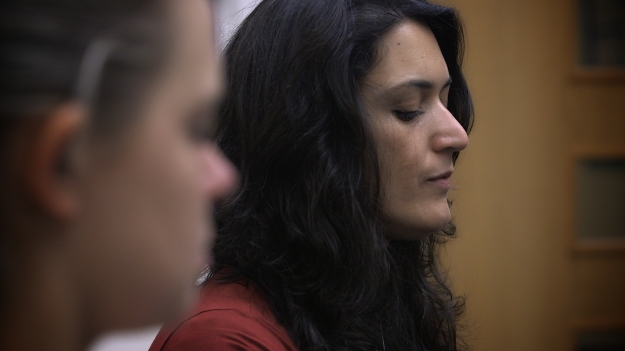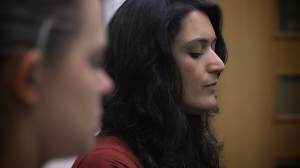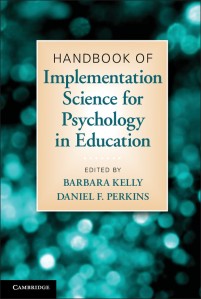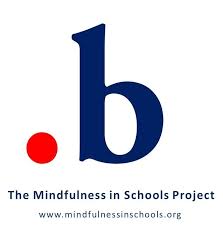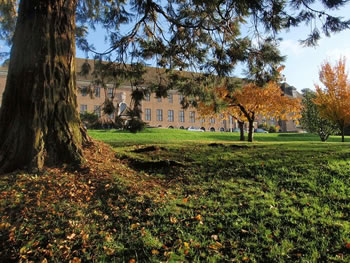
There is a regular Mindfulness Meet Up in Walthamstow. Click for more information.
Last Monday, I hosted another Mindfulness Meetup in Walthamstow. These sessions are opportunities to meet up and practice mindfulness in a group. They are for any level of experience – from complete beginners to those who have done some training and wish to practice in a group.
This evening, eleven people came along and the session started with introductions, a short mindfulness practice and a brief discussion about what we wanted from the evening. It turned out that nearly everyone was fairly or completely new to mindfulness. I introduced a bit about the background to mindfulness, including how and why Jon Kabat-Zinn developed the Mindfulness-based Stress Reduction (MBSR) Course and something about the research evidence on the benefits of practicing mindfulness regularly.

Jon Kabat-Zinn (left) and myself, at the Mindfulness Conference, Chester, 2013.
I also mentioned a study that found that even after a couple of weeks of practice, the brain already shows measurable signs of structural change in parts that enhance positive emotion and cognitive skills. So it can take weeks, rather than years, before we start feeling calmer, experiencing a deeper sense of well-being and better concentration.
The group also shared their reasons for wanting to learn more about mindfulness. Some explained that they had difficulties with general anxiety and others mentioned problems with sleeping. Some wanted to become more effective at their jobs and also to be able to ‘switch off’ from work when away from it. All wanted to explore what mindfulness might offer to them personally.
While participation in mindfulness practices affects each of us individually, research show that regularly practicing mindfulness practice can significantly reduce symptoms of anxiety and improve overall health and well-being. For example, it can improve emotional regulation, giving us skills to readjust our moods and how this in turn affects our outlook on life. We can get better at noticing what is happening in the moment and make choices quickly, so instead of going into automatic thought patterns that perpetuate stressful, we can cultivate ones that bring more positive mind-states. We can bring a sense of appreciation, calm, equanimity and overall well-being into more of the moments in our lives.

One of the mindfulness group sessions from the MBSR course.
The rest of the evening was about practicing. We were able to start glimpsing into how the mind behaves – that it wanders, quite automatically – and how to notice this and gently and kindly guide the attention back to the chosen focus (the feet on this occasion). This is a fundamental practice in the process of cultivating mindfulness.
Finally, we journeyed into a longer, sitting practice for 20 minutes, as agreed by the group. Because we had gone over the essence of the practice, there was an opportunity try this is relative silence, with only a few prompts. The focus was on cultivating mindfulness of ‘body’ and ‘breath’, with a gentle friendliness towards experiences, as best as we can. The room went beautifully quiet, still and focused, with a gentle sense of peacefulness.
At the end, a short evaluation form was completed. The feedback was really positive and I have included a few quotes here for you:
“Good intro + overview. I am not alone.”
“People were very open about reasons for attending. This relaxed me.”
“There is a wide-spead need for this sort of training.”
“It felt comfortable. Good to be able to be completely quiet/ still.”
“I enjoyed meeting like-minded people and meditating in a group for the first time. Instruction was useful and definitely considering attending the course.”
“Allowed myself space to reflect on why I might be here.”
“Able to learn strategies for relaxation and how to connect with yourself by focusing on your feet/ breath.”
“Completely new to mindfulness. Enjoyed the practice session.”
“I was able to relax more fully than I feel I’ve been able to for some time.”
 I hope this inspires you to come along to the mindfulness training offered by Holistic Education and the Mindfulness Meetups in Walthamstow, For regular updates, please join our mailing list.
I hope this inspires you to come along to the mindfulness training offered by Holistic Education and the Mindfulness Meetups in Walthamstow, For regular updates, please join our mailing list.
Best wishes, Bernadette
